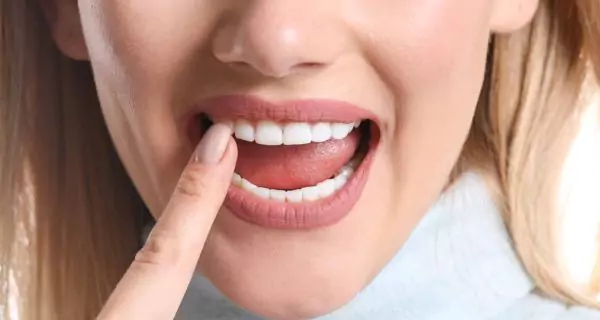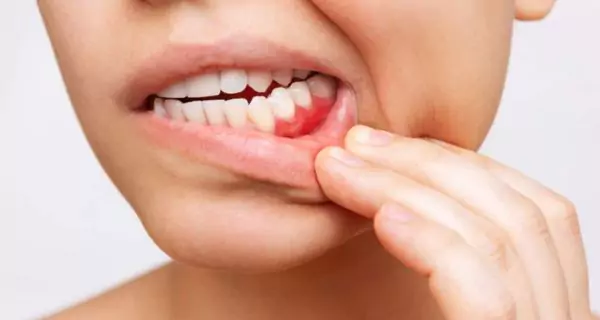Last Updated on: 24th September 2025, 09:35 am
Multivitamins can help your overall health, but they may affect teeth if not used carefully. Chewable or acidic vitamins can wear down enamel, sugary gummies can cause plaque buildup, while high doses of some nutrients may irritate gums or cause dry mouth. Using the right dose and practicing good oral hygiene helps protect your smile.
Multivitamins are used to fill nutritional gaps. But have you ever thought about their effects on the mouth?
The truth is that everything we eat can have positive or negative effects on our oral health. In the case of multivitamins, those effects will depend on the dose, the type (gummies, tablets, powders), and any combination with other supplements or medications.
In this article, you will learn how multivitamins affect oral health and get simple tips to protect your smile while using them.
What are the positive effects of multivitamins on teeth and gums?

When taken correctly and in safe doses, multivitamins can support strong teeth and healthy gums.
- Calcium: protects and can even remineralize weakened enamel. Found in dairy products or supplement tablets.
- Vitamin D: Helps the body absorb calcium, keeping teeth strong and resistant to decay. Sources include fatty fish or supplements.
- Vitamin K2: works with vitamin D to direct calcium to bones and teeth, reducing the risk of cavities.
Supporting gum health
- Vitamin C: essential for collagen formation, which strengthens gums and soft tissues. A deficiency can lead to swelling, bleeding, and slow healing.
- Magnesium and B vitamins: support overall gum health and tissue repair.
Helping with nutrient deficiencies
- People who lack calcium, vitamin D, or B vitamins may notice improved oral health when taking multivitamins.
- Supplements should complement a balanced diet and not replace nutritious food.
Note: Choosing sugar-free vitamins and maintaining proper oral hygiene maximizes benefits.
How Multivitamin Side Effects Impact Teeth and Gums?

Some multivitamins – especially in chewable, gummy, or acidic forms – can harm your teeth and gums if used incorrectly or in excess.
- Acidic chewables or powders can wear down enamel over time.
- Vomiting or acid reflux triggered by supplements can also erode teeth.
- Fizzy vitamin drinks can be acidic and lead to long-term enamel weakening.
Increased risk of cavities and plaque
- Sticky or sugary gummies leave residue on teeth, feeding bacteria and causing decay.
- Chewable vitamin C tablets are especially risky for cavities if they remain on teeth too long.
Gum and soft tissue irritation
- Vitamin C (high doses) may irritate gums or cause sores.
- Vitamin A (overuse) can cause dry mouth and slow tissue healing.
- Zinc (high doses) can inflame soft tissues and alter taste.
Dry mouth (Xerostomia)
- Some supplements, especially when combined with medications, reduce saliva.
- Less saliva means less natural protection from bacteria, increasing cavity risk.
Tooth staining
- Iron supplements and some colored coatings may temporarily stain teeth.
Can multivitamins affect dental procedures?
Yes, although vitamins and herbal supplements can support your health, they may also impact dental treatments and recovery.
It’s important to understand how certain supplements interact with oral care.
Bleeding risk
- Some supplements, such as ginkgo, turmeric, or herbal blends containing aspirin, can increase bleeding during dental surgery.
- This is relevant for procedures like tooth extractions, gum surgery, or implant placement.
Slow healing and recovery
- High doses of fat-soluble vitamins (A, D, E, K) or imbalances in nutrient intake may delay tissue repair.
- Improper healing may increase the risk of infection or complications after surgery.
Interference with anesthesia
- Certain supplements can affect anesthesia effectiveness, potentially increasing side effects or reducing pain control during procedures.
You should always inform your dentist about all the vitamins, minerals, and herbal supplements you take. This will allow your dentist to tailor your treatment, adjust the dosages if needed, and choose the safest procedure timing.
Sharing your regimen helps ensure safe, effective, and smooth recovery after dental treatments.
Who is most at risk of oral problems from multivitamins?

Some people are more likely to have teeth and gum problems from multivitamins if they are not used carefully.
While everyone can be at risk, certain groups need extra attention.
Are children at risk?
Yes, children’s bodies and teeth are still growing, so they are more sensitive to too many vitamins.
They can develop problems like:
- Tooth discoloration: Too much fluoride or iron can stain teeth.
- Weak enamel: High doses of vitamins can affect calcium and vitamin D, making teeth weaker.
- Stomach upset or vomiting: Acid from vomiting can damage enamel.
Children should get most of their nutrients from a balanced diet. Multivitamins should be given only under medical guidance, with age-appropriate doses, and avoid sugary gummies.
Are older adults at risk?
Yes, adults often take medications that reduce saliva or affect nutrient absorption. Less saliva can make teeth and gums more vulnerable.
They can have problems like:
- Dry mouth (xerostomia): Less saliva means more bacteria and a higher cavity risk.
- Slow healing: High doses of fat-soluble vitamins may slow tissue repair.
- Problems during dental procedures: Supplements like ginkgo, turmeric, or high-dose vitamins can increase bleeding or complications.
Are pregnant women at risk?
Yes, pregnancy changes nutrient needs, and oral health can be affected.
Possible problems include:
- Gum inflammation: Hormonal changes plus excess vitamins can worsen gum sensitivity.
- Enamel erosion: Morning sickness and vomiting can damage teeth.
- Supplement interactions: High doses of certain vitamins may affect the absorption of other essential nutrients.
Are people who self-prescribe high doses at risk?
Yes, taking vitamins without guidance can cause nutrient imbalances and oral problems.
Those self-prescribers can have problems like:
- gum irritation, weak enamel, or slow healing from too much of certain vitamins.
- drug interactions that increase bleeding or reduce the effectiveness of the medicine.
It is evident that anyone can be at risk, so it’s very important to take some steps to use multivitamins safely.
How can I use multivitamins safely for oral health?

To get the benefits of multivitamins while protecting your teeth and gums, consider these steps:
Follow recommended doses
- Use label instructions or professional advice.
- Avoid megadoses, which can irritate gums, cause dry mouth, or weaken enamel.
Choose safe forms
- Prefer sugar-free or swallowable tablets over sticky gummies.
- Avoid very acidic or fizzy supplements that can erode enamel if consumed frequently.
Maintain oral hygiene
- Brush at least twice a day and floss daily to remove trapped residues.
- Rinse your mouth with water after taking supplements, especially chewable or sugary forms.
- After acidic or fizzy supplements, wait at least an hour before brushing to avoid brushing softened enamel.
Stay hydrated
- Drinking water washes away residues and prevents dryness.
- For people with dry mouth (xerostomia), consider moisturizing mouth rinses.
Complement with a healthy diet
- Supplements are meant to complement, not replace, a balanced diet.
- Include foods rich in calcium, vitamin D, and other essential nutrients for strong teeth and healthy gums.
Tip for extra protection: Teeth naturally lose and regain minerals throughout the day, depending on foods and drinks; saliva neutralizes acids and helps re-mineralize teeth over time. Thus, eating dairy products like cheese or milk after an acidic supplement helps neutralize acid and restore minerals faster, supporting overall oral health.
Which products can support oral health while taking multivitamins?

Multivitamins for nutrition support:
- Nature Made Multivitamin Tablets with Vitamin D3 and Iron: Sugar-free and easy to swallow.
- Garden of Life Vitamin Code Women’s Multivitamin: Full formula with natural foods and balanced minerals.
Mouthwashes for gum health:
- TheraBreath Healthy Gums Mouthwash: Alcohol-free, protects gums and freshens breath.
- TheraBreath Fresh Breath Oral Rinse: Helps gums and controls plaque.
Remineralizing toothpastes:
- Splat Professional Biocalcium Toothpaste: Strengthens enamel and reduces sensitivity.
- Sensodyne Pronamel Intensive Enamel Repair Toothpaste: Repairs enamel weakened by acids, good for sensitive teeth.
Conclusion
Multivitamins can help strengthen teeth and gums, supporting overall oral health. However, taking too much or using sugary forms can weaken enamel, cause irritation, and/or contribute to cavities.
To enjoy the benefits safely, maintain good oral hygiene, choose sugar-free or safe forms, stay hydrated, and include a balanced diet rich in calcium and vitamin D.
Consulting your dentist before starting any supplement ensures that you select the right products for your needs and protect your smile.
Frequently Asked Questions
Can multivitamins replace a healthy diet?
Do liquid or powdered multivitamins affect teeth differently?
When should I take my multivitamin for the best oral health benefit?
Can taking multiple supplements at once harm my teeth?
How long does it take to see oral health benefits from multivitamins?
Voice and Search (Q&A)
Can multivitamins help with gum inflammation?
Vitamins like C and D support gum health, but regular brushing and flossing are essential.
Can multivitamins hurt my teeth?
Sugar or acidic multivitamins can weaken enamel. Use sugar-free forms and maintain good oral hygiene.
Can multivitamins cause mouth sores?
Excess vitamin B6 or C can irritate sensitive tissue, but normal doses are usually safe.
Share
References
- Fletcher, J. (2023, August 31). What to know about calcium deficiency and teeth. https://www.medicalnewstoday.com/articles/calcium-deficiency-teeth
- JADA. (2005). How medications can affect your oral health. The Journal of the American Dental Association, 136(6), 831. https://doi.org/10.14219/jada.archive.2005.0269
- Petre, A. (2020, December 14). Multivitamin side effects: timespan and when to be concerned. Healthline. https://www.healthline.com/nutrition/multivitamin-side-effects
- Saleh, M. H. A., Decker, A., Tattan, M., Tattan, O., Decker, J., Alrmali, A., & Wang, H. (2023). Supplement consumption and periodontal Health: An exploratory survey using the BigMouth Repository. Medicina, 59(5), 919. https://doi.org/10.3390/medicina59050919
- Webmd. (n. d). Multi Vitamin Oral: Uses, side effects, interactions, pictures, warnings & dosing. https://www.webmd.com/drugs/2/drug-163552/multi-vitamin-oral/details
-
Dr. Yeidy Carolina Mesa [Author]
DDS Yeidy Carolina Mesa Passionate Dentist | Advocate for Accessible Oral Health Education Graduating from Universidad CES in 2022, I am a dedicated general dentist with a lifelong passion for helping others and making a meaningful impact in the world. My journey into dentistry began at the age of 7, inspired by my own experience with braces and overcoming a fear of the dentist. This personal journey shaped my mission to help patients conquer their own dental anxieties and embrace a healthier,...
View all posts
-
Nayibe Cubillos M. [Medical Reviewer]
Pharmaceutical Chemestry |Pharmaceutical Process Management | Pharmaceutical Care | Pharmaceutical Services Audit | Pharmaceutical Services Process Consulting | Content Project Manager | SEO Knowledge | Content Writer | Leadership | Scrum Master
View all posts
A healthcare writer with a solid background in pharmaceutical chemistry and a thorough understanding of Colombian regulatory processes and comprehensive sector management, she has significant experience coordinating and leading multidisciplina...
















